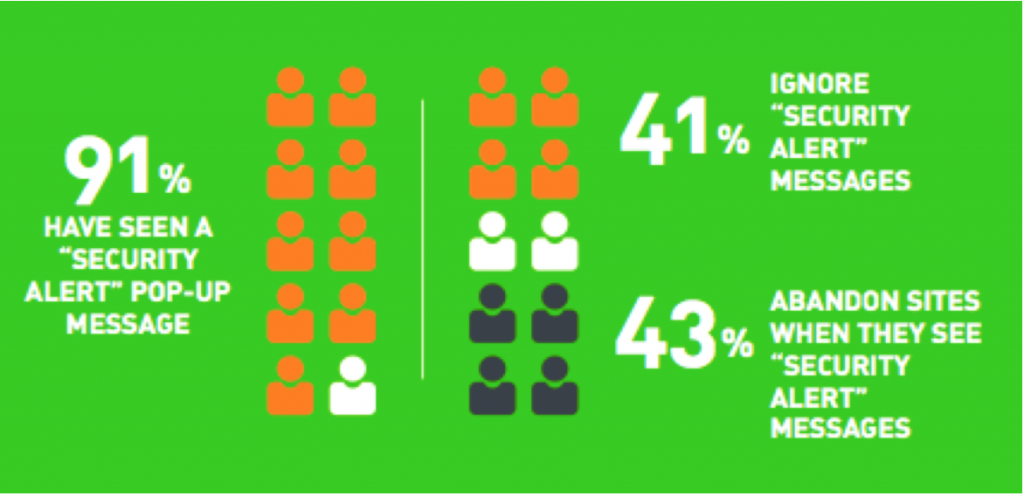COVID-19 pandemic has brought most of our day to day activities to an online platform, including education, work offices, entertainment, commerce, and many other services. Whether you are an internet user or a website owner, by now, many of you must have come across the term SSL certificate. Many others must have noticed the padlock icon before the URL of a website and might have even started to relate them with web security. There is another term, “HTTPS” in the world of internet security, that needs to be understood, and it is equally crucial for all of you to know the difference between ‘HTTP’ and ‘HTTPS,’ what these terms stand for, and that how they affect our internet experience.
 Statistics from a survey conducted by Venafi shows that at least 91% of web users have seen a security alert message in their browser, of which more than half leave the website immediately.
Statistics from a survey conducted by Venafi shows that at least 91% of web users have seen a security alert message in their browser, of which more than half leave the website immediately.
With rising, data security awareness among users and website owners alike, the first and foremost thing to understand is that HTTPS or Secure Socket Layer ( SSL ) is the only complete solution to all your web security needs. This protocol encrypts all the information exchange over the internet between the user’s web browser and the web server, hence providing a secure path against any data breach.
Understanding HTTPS and HTTP
HTTP is the primary protocol followed for all the communication carried out over the internet. Since this protocol does not use encryption for data exchange between the web browser and web server, it is prone to data theft by hackers. On the other hand, HTTPS is a secured protocol, where ‘S’ in HTTPS stands for secure and encrypts any data exchange over the internet, thereby protecting it from any potential data theft.
SSL Certificate and HTTPS
Secure Socket Layer (SSL) refers to an encrypted website security protocol that ensures a secure data exchange between the user and the web server over the internet. You can buy an SSL Certificate for your website from an authorized SSL Certificate provider according to your budget and security requirements. Once SSL Certificate is installed on your web server, the website’s protocol changes from HTTP to HTTPS. The URL of the SSL secured website is preceded by a padlock, which gives an immediate visual trust factor for visitors to visit a secured environment.
More and more websites are now SSL secured and are switching over to HTTPS. Not just for websites handling financial transactions but for all the other websites, too, SSL Certificate is becoming routine. So, let us now look into the various benefits of SSL Certificates and HTTPS.
Security Advantage
An SSL secured website shifts its protocol to HTTPS, ensuring that the user’s web browser encrypts the crucial information before sending it to the webserver. The encryption renders the user’s sensitive data, like your passwords, login credentials, bank account information, inaccessible to hackers. However, this information can be easily decoded by the webserver, which has the authorized key to do so. The SSL Security also provides full security to the website from phishing attacks and various other cyber hacking.
Website Authentication
SSL Certificate or HTTPS allows a unique digital identification number to the website server, which is used to authenticate its identity to the user’s web browser through a process called ‘handshaking.’ The authentication process protects visitors from fake websites using a false identity to impersonate their website identity and missing the user’s online identity to carry out unauthorized money transactions.
Prevents Data Tampering in Transit
SSL provides data integrity to the information exchanged between the web browser and the web server by digitally signing it so that no data distortion occurs before it reaches the intended receiver.
Boosts User’s Trust
With so much buzz around cyber safety and the increased use of online platforms, there is a lot of anxiety and concern regarding sharing user’s personal information. Simultaneously, already a lot of awareness can be seen in the pattern in which netizens choose to visit various websites. They look for visual trust symbols for secure websites before visiting them, and HTTPS protocol gives them a trust symbol of padlock which they can trust. It instills confidence in them that their data will be safe here.
Increased Conversions
When a user visits a website with HTTP protocol, Google gives a shout out that the visited website is ‘Not Secure.’ This causes the visitor to leave immediately and undermines any chances of conversion. On the other hand, the HTTPS protocol gives them a secure environment where they don’t have to worry about their crucial personal information safety. This dramatically improves their user experience and, in turn, increases the chances of conversion. So, SSL security helps businesses to maximize revenue.
Improved Google Ranking
When there is so much competition among the online platforms, creating better visibility for your business should surely be of utmost importance to you. A better ranking on the Google Search Engine Result Page(SERP) can give you better visibility and increase traffic to your website. Google encourages an SSL secured platform as a policy, and hence an HTTPS website gets a better ranking in the Google Search Engine Result Page than an unsecured HTTP website.
In Conclusion
HTTPS is the way to go if you want your website to be a safe place for customers, to create and maintain a bond of trust with them, and to ensure their information remains safeguarded from the prying eyes of hackers and cybercriminals.
The faster your domain shifts from HTTP to HTTPS, the better it will be both for your website, it’s reputation as well as it’s customers.

